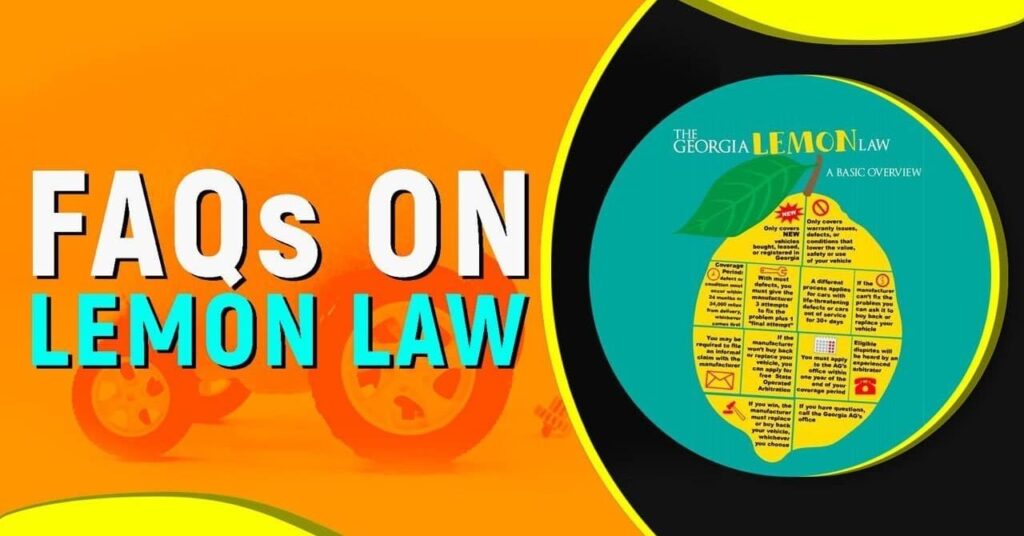When life hands you lemons, you make lemonade, but what if those lemons turn out to be your new car? Fortunately, Lemon Laws are here to protect consumers from sour experiences with defective vehicles. 10 common questions about Lemon Laws, including why it’s called Lemon Law, the cash and keep settlement example, and provide a real-life cash and keep settlement example.
1. Why is it Called Lemon Law?
The term “Lemon Law” has a zesty origin. It can be traced back to the 1960s when frustrated consumers referred to their defective vehicles as “lemons.” In this context, the word “lemon” signifies a flawed, unreliable, or unsatisfactory product, much like a sour lemon. Hence, “Lemon Law” emerged as legislation designed to protect consumers from being stuck with these defective vehicles.
2. What is a Lemon Law?
Lemon Laws are state-specific regulations that provide legal remedies to consumers who purchase or lease vehicles that repeatedly exhibit manufacturing defects or issues that significantly impair their use, safety, or value. These laws vary from state to state, but they generally require manufacturers to repair or replace the defective vehicle or provide a refund.
3. How Does Lemon Law Work?
When a consumer experiences problems with their vehicle, they must typically follow a specific process to benefit from Lemon Law protections. This process includes:
Recurring Issues: The vehicle must have undergone multiple unsuccessful repair attempts within a specified timeframe or have been out of service for several days due to repairs.
Notification: The consumer must notify the manufacturer or dealer about the defects and allow them to repair the issues.
Arbitration or Lawsuit: If the manufacturer fails to resolve the problem, the consumer can proceed with arbitration or file a lawsuit to enforce their Lemon Law rights.
4. What is a Cash and Keep Settlement in Lemon Law
A Cash and Keep Settlement in Lemon Law is an option for consumers under Lemon Law when their vehicle qualifies as a lemon. In this scenario, the manufacturer offers the consumer a monetary settlement to compensate for the vehicle’s diminished value or inconvenience, allowing the consumer to keep the problematic vehicle. It’s a way to resolve the dispute without replacing or repurchasing the vehicle.
5. Cash and Keep Settlement Example
Scenario: Sarah purchased a brand-new car, but it experienced recurring transmission issues within a few months. Despite multiple repair attempts, the problem persisted.
Cash and Keep Offer: The manufacturer offers Sarah a Cash and Keep Settlement of $10,000 to compensate for her vehicle’s diminished value and inconvenience. Sarah accepts the offer, keeps the car, and uses the cash to offset the reduced resale value due to the transmission issues.
6. Can I Still Use My Vehicle with a Cash and Keep Settlement?
You can continue using your vehicle with a Cash and Keep Settlement. However, it’s essential to understand that this option doesn’t resolve the underlying issues. You’ll receive compensation for the inconvenience and diminished value, but the defects may still be present. It’s crucial to weigh this settlement option’s pros and cons carefully.
7. When Should I Consider a Cash and Keep Settlement?
A Cash and Keep Settlement might be a viable option if:
- You are attached to your vehicle and are willing to tolerate its defects.
- The offered compensation adequately covers the diminished value and inconvenience.
- You know the potential risks and future repair costs associated with the vehicle’s defects.
8. Are Lemon Laws the Same in Every State?
No, Lemon Laws vary from state to state, which means the specific criteria, procedures, and remedies available to consumers can differ significantly. It’s crucial to familiarize yourself with the Lemon Laws in your state or seek legal advice from a local Lemon Law attorney.
9. How Can a California Lemon Law Attorney Help?
If you’re facing Lemon Law issues in California, it’s essential to consult with a knowledgeable California Lemon Law attorney. They can assist you by:
- Assessing the validity of your claim.
- Navigating the complex legal process.
- Negotiating with manufacturers for a favorable resolution.
- Representing you in court if necessary.
10. What’s the Conclusion?
Lemon Laws protect consumers from being stuck with “lemons” – vehicles with recurring defects or issues. A Cash and Keep Settlement is a possible resolution option, allowing you to receive compensation while retaining your problematic vehicle. However, it’s crucial to consider the implications carefully.
If you’re dealing with Lemon Law issues in California, check their website for expert guidance and representation. They have a team of experienced professionals who can help you navigate the intricacies of Lemon Law and ensure your rights are protected.
So, the next time life hands you a lemon of a car, remember that Lemon Laws are there to ensure you don’t have to swallow the sour taste of a defective vehicle. Seek the help you need, and turn those lemons into lemonade!






